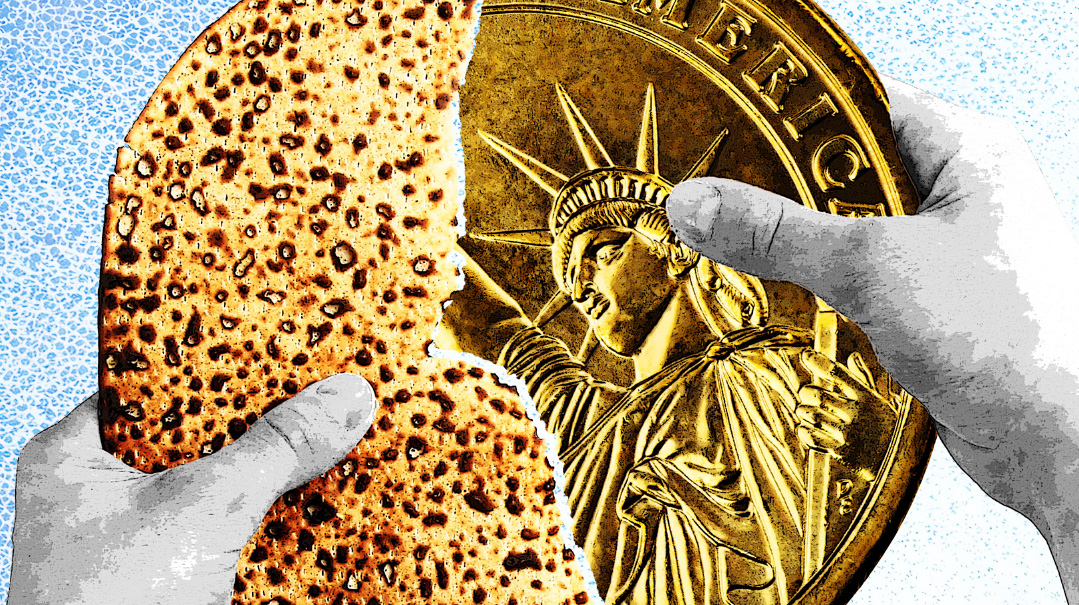Double Vision
| January 6, 2021Our son’s rebbi thought he knew him better than we did

Mendy: Why are you encouraging our son to look into a shidduch we know isn’t for him?
Reb Yehoshua: Your son wants something different and you just won’t listen.
Mendy
"Pesach’s on the way,” Minna announced, one icy evening in December. I blinked.
“Pesach? We’re just about done Chanukah.” I looked at Minna questioningly. Cleaning already? It didn’t look like it, and besides, Minna was efficient, but not extreme.
She laughed. “No, no, not Pesach Pesach, I mean Pesach bein hazmanim. Yossi. Shidduchim.” She stressed the last word so I couldn’t miss the significance.
I was surprised. “Is Yossi in shidduchim? We could give it another year, no?”
Minna gave me a look. “He’s 23, we started the others even earlier.”
Yossi? Twenty-three? I rubbed my forehead. Where did the years go?
Minna shrugged as she set down two salad bowls and a glass dish with piping-hot meat. I kept telling her there was no need to serve supper on real dishes, it was just the two of us after all, but she said that was why she did it.
“All the years with kids home we used the cheap stuff, now let me set a table how it’s meant to be set,” she’d told me.
We let the conversation about shidduchim slide; Minna knew I trusted her to start the process, narrow down the candidates, and present me with the information when she was ready to say yes. Some fathers like to be super-involved in every aspect of their kids’ shidduchim, but I was blessed with a wife who loved doing shidduch research and knew how to find out every last detail. Yossi’s our youngest — his three older brothers and two sisters are married already — and by now Minna had honed her shidduch protocol to a fine art. She has her preferred shadchan who knows the type of family we’re looking for, on every prospective shidduch she has a file that would rival a police dossier, and she can probably do a research call in her sleep — and get every one of her 60-plus questions answered.
I was grateful that she was capable of handling the thousands of phone calls. My schedule was jam-packed: full days at the office, minyan, my daf yomi shiur every morning, preparing every night. I preferred getting the rundown from her only once she’d narrowed the list down from hundreds of names to the one she felt would suit our son best. Minna also appreciated how limited my time was — she knew that handling shidduch calls left me able to use those precious evening hours for learning. Our kollel years were long over, but it was nice that she still had that idealism for Torah. It was something we really tried to give over to the children as well, notwithstanding the successful family business. All our sons spent time in Eretz Yisrael learning after the chasunah, and I was sure Yossi would want to do the same.
But first things first, the harrowing — and hallowed — shidduchim process.
I mentioned it the very next time Yossi called home. “Mommy’s been busy with phone calls, you know,” I hinted. “Your ticket to come back is booked for just before Rosh Chodesh. We want to leave plenty of time.”
There was a pause at the other end. “Oh,” Yossi said finally. Was that hesitance in his tone? “But… Tatty? I don’t… I’m not sure exactly, you know… what I’m looking for.”
What he was looking for? He didn’t have to look anywhere; we were doing the work for him. “Don’t worry, your mother’s got everything under control,” I told him. “Remember, we’ve done this before. Mommy knows what to look out for and she’ll tell you everything once we have a yes.”
I told Minna about the conversation later that evening. Yossi was young, he’d probably never given shidduchim a thought before, and now he thought he’d have to prepare us a list of top ten qualities to look for in a girl or something. It was sweet and earnest but like I told him, we’d done this before. Shimon, Ezriel, and Dovid were all happily married, and as the parents, we would do the time-consuming work of narrowing down appropriate suggestions.
But Minna looked perturbed when I told her what Yossi had said. “He doesn’t know what he’s looking for? What’s there to know?” she asked, brow furrowed in confusion. “A good girl from a good family, middos, chesed, geshikt and talented, the right type, isn’t that all? Personality, fine, that’s why they’ll meet, but what’s the big deal? He doesn’t trust his parents?”
I hastened to reassure her. “No, no, of course he trusts you. I guess it’s just intimidating for him, knowing he’ll be coming home in a few months and starting to date. Don’t worry, Minna, I have full faith in your investigative abilities.”
“Well, I’ve had plenty of practice, you know.” She gave a wry smile and her eyes flickered to the thick binder on the counter. “And by the way, there are four new names as of this morning. Word travels fast.”
I made an impressed face. “Anything that sounds right?”
Minna made a nu-nu gesture. “Two familiar names, both of them have big money, but I wouldn’t rush into those without making sure they’re the kind of family we’re looking for, of course. Then again, there was one, the granddaughter of some big rosh yeshivah in Eretz Yisrael, nice yichus and a chashuve family, very Torahdig, but they can’t offer any support. I don’t think that would work. It’s not just the money, we could handle that — it’s the family style, you know? I can’t see Yossi having kids dressed in hand-me-downs or living on a tight budget.”
I agreed with Minna. Family was important; Yossi needed a girl from a similar background, who would run a home where Yossi felt comfortable, encourage him to shteig for a few years, and stand behind him when he would eventually join the family business.
I nodded. “So, what was the fourth name that was suggested this morning?”
Minna licked her finger and turned a page in her notebook. “We’ll see,” she said noncommittally. “Sounded like a perfect family, but the girl… I don’t know, nothing spoke to me, you know?”
“Mm.” I didn’t exactly know how she could make a judgment based on a single phone call, but I trusted her intuition.
“There was something else, Mrs. Gordon called a couple of months back. I didn’t think much of it at the time, but maybe I should call her back, it sounded interesting,” Minna said thoughtfully. “I wonder if that would be a better idea for Yossi.”
Turned out, Mrs. Gordon’s idea was more than interesting. “I really think this has potential,” Minna gushed as we drove to a wedding one evening. “I spoke to two of the girl’s seminary teachers today, and they had such beautiful things to say! And the family, they’re known as tremendous baalei chesed, her father actually has his own kollel…”
My phone buzzed, and Yossi’s name came up on the car’s display. “The boy himself,” I announced, hitting the button to answer the call.
“Yossi! What’s the good word? Mommy is here with me, we’re on our way to a chasunah.”
“Hi, Tatty. Hi, Mommy.” Yossi’s voice filled the car, cautious. “How are you? How’s everything?”
“Baruch Hashem, wonderful,” I told him. “Mommy’s been busy on your behalf these last few days.”
“Yes… with shidduchim.” He stated it like there was something wrong with the word. “Uh, actually, I wanted to discuss that with you.”
I looked at Minna, she looked back at me, and then we both shrugged. “Go on,” I said.
“I was thinking, you know, about what we discussed… what I’m looking for.”
I’d never heard my son stammer before. What was up?
“So, uh, I wanted to ask you… can we look for a girl, you know, a certain type — someone who’s very machshiv Torah and learning, you know what I mean?”
Again the stammering! I glanced over at Minna, but she was leaning forward to answer. Her lips were very tight.
“Of course we’re looking for a girl — for a family — who values Torah!” she exclaimed. I could hear that she was hurt by Yossi’s question. “That’s one of the first things I ask about! You know that we’re looking for a family where you’ll feel at home, Yossi, where you’ll fit in easily — a family like ours. You know, comfortable but Torahdig, stable parnassah, family-minded… it’s very important to come from the same sort of cultural background, have similar ideas about lifestyle and standards… it’s very important,” she emphasized again.
But Yossi was still stammering. “I know, Mommy, I hear what you’re looking for, but I’ve been thinking, I spoke to my rebbi a lot, and I was hoping we could look for something a little, you know… simpler.” Now that he got that dreaded word out, he continued more easily. “Like maybe a girl who wants to live in Eretz Yisrael a bit longer-term, I’ve been seeing families that have lived here for years, and it’s really special. The atmosphere in the house, you know, it’s like… ruchniyusdig.”
I turned off the highway; we were five minutes away from the hall. Time to end this conversation.
“Yossi, we hear you, thanks for sharing your thoughts,” I said quickly, before Minna could jump in and things would escalate. “Mommy and I will keep that in mind, but you know there are a lot of considerations in shidduchim, we have to make sure things are really best for you.”
The conversation bothered Minna a lot more than it did me. I remembered this from Ezriel’s yeshivah days, and didn’t Dovid go through such a phase as well? It wasn’t that they didn’t appreciate us, or thought we didn’t value Torah. It was just that they were immersed in another world and seeing a different sort of lifestyle up close.
“He’s young, he’s idealistic, and he’s in a bit of a bubble,” I said bluntly, much later that night, when we were driving home. “The other boys went through this too, but look at them now, perfectly happy to join the business and relieved to have parnassah in place. He’ll have his years in Israel, and I can assure you he’ll be more than happy with a brand-new place in Schneller instead of a cramped fourth-floor apartment that hasn’t been redone since the 1950s.”
Minna looked aghast at the idea of Yossi living in a hovel. But for me, that wasn’t the main issue — it could even be a good learning experience for the kids, I mused. The point here was simply that Yossi needed something that he was used to: a girl like his sisters, a lifestyle and standards that wouldn’t be too culturally different from ours.
Minna agreed with that 100 percent. She spent the rest of the drive telling me some sad story about a girl and boy who got married, from totally different social strata, and got divorced within a year.
“He’s young, he doesn’t know these things,” I repeated. “But when he comes home for Pesach, we’ll discuss it. He’ll come around.”
Then out of the blue, Minna got a call. It came just as we sat down for supper, and Minna jumped up.
“I think it might be that reference, you know, the rav I was trying to get hold of all day. Sorry. I just don’t want to miss him now…”
She dashed into the other room, and I heard her say a breathless hello while she thumbed through her files.
“You’re — oh.” Her voice changed. “Actually, we’re looking into something now… I’ll take down the details and get back to you if we’re interested — what was that?” There was something sharp in her tone. “So, in terms of support, what are they actually expecting?”
A few minutes’ silence, and then she said coldly, “Thanks for thinking of us, but it’s not what we’re looking for.” She paused again. “No, not at all. I don’t know where you got that information from. We’re looking for something completely different.”
I waited for her to give me the rundown. “Who was that? A shadchan, I’m guessing?”
Minna was flushed. “Yes, a Mrs. Pranzer or something? She had a suggestion — you have no idea, it was so off. Out-of-town family, the parents are baalei teshuvah, mother works as a dentist, the father is still in kollel. The girl is, apparently, incredible — amazing, geshikt, gorgeous, wants a long-term learner — totally not Yossi’s plans, by the way. Plus, you know what the real chutzpah is?” She stopped to suck in a breath. “They have no money. They expect us to support our own son in learning!”
“You told them no.”
“Of course I told them no. It’s completely not our style, not the family background, not the financial aspect, not the simplicity… the girl could be Sarah Imeinu herself, but it’s not going to be right for Yossi.”
“It doesn’t sound right at all,” I agreed. “I wonder what made her think of it.”
“Oh — I didn’t say?” Minna gave a short, bitter laugh. “That was the best part. Apparently, Yossi’s rebbi was the one who spoke to the shadchan. He reassured her that this was exactly what our son was looking for.”
When I left work a few days later, my voice mail icon was flashing. I had a missed call from Yossi’s Israel cell phone. I pressed play.
Hi, Tatty, it’s Yossi, can you call me back? It’s really important.
I called him right back. There was a niggling feeling in my gut. I knew what this conversation was going to be about.
“Tatty, I know about the shidduch that Mommy got a call about,” he said, words tripping over each other in his rush to get it out. “It was actually my rebbi’s wife’s idea — she taught the girl in seminary. I — I think it sounds like exactly what I want… I heard such nice things about her. Like chesed, middos, her strong values, and her she’ifos, you know, she has a family who really sacrifices for Torah…”
I took a deep breath. It was great that he valued sacrificing for Torah, but that was what he saw at home. Didn’t I get up at 5 a.m. each morning to give a daf yomi shiur before Shacharis? Hadn’t Minna spent years manning the fort early in the morning, dealing with bedtime alone, just so that I could get in those precious hours? What about the late-night learning, the Shabbos chavrusas… did he think Torah belonged only to the poor kollel families? Was this what his rebbi was feeding him?
I felt a flash of anger — how could some young rebbi who’s known our son for a couple of short years think he knew better than us what he was looking for?
But this was not the time to get emotional or defensive. Yossi didn’t understand, but he would, when he grew up a little, left his rosy bubble of yeshivah, and landed back on solid ground.
“Listen to me, Yossi,” I said. “There are certain things in shidduchim that the parents know best. Trust me, we have your best interests in mind. She sounds like a wonderful girl, but this is not the shidduch for you.”
Yossi listened quietly. “I hear you, Tatty,” he said. “And I understand what you’re saying, but my rebbi feels this shidduch is a good idea for me…and the girl said yes already. Please Tatty, I’d like to look into it. I’d like to meet her.”
If I could tell Reb Yehoshua one thing, it would be: How can you encourage our son to go forward with a shidduch that we feel is completely wrong for him, his background, and his lifestyle?
Reb Yehoshua
Yossi was one of my bochurim, and by that I don’t mean one of the guys who sat in shiur, asked a couple of questions, and went on their way. He’d been in my shiur for two years, and I’d gotten to know him well. He had a good head and learned well, but he also had a certain depth about him, and a simple sort of refinement unusual for his background — I understood that he came from a wealthy home.
Over time, Yossi became something of a ben bayis by my house. We had him over for Shabbos meals at least once a month, he was great with the kids, and never failed to bring a small gift and thank my wife.
“So, you’re Reiss from where?” my wife asked the first week we had him over. She’s taught in a seminary for a number of years, and Jewish geography is probably her favorite game.
I liked how Yossi’s face lit up when he talked about his parents. They were well-known baalei tzedakah, and my wife mentioned that.
“His father is a big talmid chacham as well, he gives a very popular daf yomi shiur,” I told Rina, knowing Yossi would appreciate it. He did, shooting me a grateful look. This boy was something unusual — so sincere, so real in his desire for Torah above all, despite growing up with material wealth in abundance.
“Your parents must be very special, the way they raised you all to appreciate Torah even though your father is so successful in business,” I mentioned to Yossi once. He nodded and smiled with pride, but there was also a flicker of — something — in his eye. I couldn’t decipher it.
It wasn’t until a few weeks later that he brought up the subject again.
“Does Rebbi have a minute?”
When a bochur approaches almost furtively, glancing in all directions and blushing slightly, I can usually predict what the conversation will be about. I ushered Yossi into the small office I used for talking to my boys, and gestured at him to take a seat.
“What’s up?”
Yossi played with an old computer keyboard, its wire dangling, the monitor long relegated to the garbage. “It’s… about shidduchim, Rebbi. My parents mentioned to me last night… they want me to start Pesach time.”
He looked so miserable, I was puzzled. He didn’t feel ready for it? Yossi was one of the most mature bochurim in the shiur. And he had everything going for him in shidduchim — he was a top boy from a family with yichus, Torah, money, the works.
“I’m sure they’re getting great suggestions, you’ll be a good husband, im yirtzeh Hashem,” I told him with a smile. He didn’t smile back.
“It’s not that.” He looked so uncomfortable, my heart went out to him. “It’s what they’re looking for. I know what they want, a girl like my sisters-in-law… like my sisters.”
I waited.
“They’re great and all that, don’t get me wrong,” he hastened to say. “But… I keep feeling like I want something different. The gashmiyus, the being busy with fashion and furniture and clothing and matching kids’ outfits… my brothers all joined the family business after a year or two in Israel, one of them even came back after six months! And my parents are special, agreed, but my brothers’ homes… I see how their kids are growing up, all the technology and materialism… it’s not me. I don’t want to join the rat race. I want… more,” he ended, vaguely, hand dropping limply to his side.
But I knew what he meant. I knew he was thinking of a typical Friday night scene in my small dining room, borrowed chairs squeezed around a simple folding table, everything neat and clean but nothing fancy or luxurious about it. We had chicken and potatoes for the main course; at Yossi’s house that would have been a weeknight supper — they served at least two types of meat and four sides for Friday night main. Plus wines, scotch, two types of fish, exotic salads, all b’ravchus.
“It’s not like I don’t enjoy it,” Yossi clarified, blushing even deeper. “But it’s not me, it’s not what I want in a home. I want… something that will allow me to focus on what really matters. I want to live here in Israel as long as possible, I don’t want to marry a pampered princess who misses her mother and counts down until we can move back, I can start working, and we can live on an even higher standard…”
I got him. It was a hard one.
We spent a while discussing how he could raise the issue with his parents. He didn’t look too hopeful, but still, it had to be the first step. They were good people, the Reisses, maybe they would surprise him and be willing to change the direction of their search to meet his needs.
And then my wife, Rina, came up with a shidduch idea.
“I’m telling you, this is the girl for Yossi,” she told me, eyes sparkling. I had to admit, it did sound good. Aliza Berman had been Rina’s student the previous year, and the way my wife described her, she sounded perfect. A girl with strong values, refinement, willing to sacrifice for Torah, a baalas middos who was sensitive to others, and phenomenally talented to boot.
We decided to ask a prominent American shadchan to try to get it off the ground. I knew the family was not what the Reisses would have normally considered for mechutanim — the parents came from a less religious background, and they didn’t have much money — but still, this girl was clearly a gem, the house sounded like a real Torah home, and most importantly, a wife who was used to making do with less and putting ruchniyus before gashmiyus would enable Yossi to achieve his dreams of a simple, spiritually strong home where Torah would remain the focus. Maybe if Yossi spoke to his parents openly about his dreams, they would be open to looking into the suggestion?
“We can definitely give it a try,” I told Rina. She offered to give the details over to an American shadchan that she knew well.
“I can just see the two of them together… it would be so perfect,” she told me.
I didn’t want to get my hopes up too high, but it was hard to resist her enthusiasm. “The shadchanus would come in handy too,” I said, only half-joking. Maybe it really would work?
And maybe I was hopelessly naïve.
“The parents refuse to even consider it. Point-blank refuse.” Rina’s eyes flashed. “Apparently they were angry about the suggestion, that the girl’s side has no money — can you imagine? They’re blessed with more money than they know what to do with. They can’t bring themselves to support one son on their own, without the other side chipping in?”
I held out a hand. “Wait, hold on. This is for sure about money? There could be any reason that they said no.”
“They didn’t even consider it. They didn’t even want to hear about the girl. Once Mrs. Pranzer mentioned the family, the mother just ended the conversation.”
That’s what Yossi described, too. He’d told me about his attempts to engage his parents in conversation about shidduchim, how their minds were set in a certain direction, and they simply wouldn’t budge from their stance.
I hardly slept that night. It wasn’t about this shidduch in particular; it was going to be a problem every time, as long as they were looking for a girl that wasn’t right for Yossi.
That’s when I came to a decision.
“Call Mrs. Pranzer,” I told my wife. “Tell her to suggest it to the girl’s side. Let me know if they say yes, and I’ll see what I can do.”
A few nights later, I came home from yeshivah to find her all smiles. “It’s a yes!” she crowed. “The Bermans are very interested in the shidduch!”
Well, there was no reason for them not to be, Yossi was a fantastic catch. Now would be the hard part.
This time, I was the one to pull Yossi aside after shiur. We headed back to the old office — it was becoming familiar territory these days — and I told him about the shidduch.
“Listen, I don’t know that this is the one for you, I just know that the way this is going, you’re not going to get to meet the kind of girl you’re looking for, unless you do something about it,” I told him bluntly. “Your parents are looking for a girl like the rest of your family, and that isn’t going to be a girl who will support your dreams of a simpler lifestyle, maybe staying in kollel long-term, the things we’ve been talking about. So it might not be this girl, but it will still be a good opportunity to confront the issues, get on the same page, try to get your parents to understand what you’re looking for on a practical level.”
Yossi nodded slowly, thinking. He was a mature guy, he thought things through, and I knew this was what he wanted.
“I’ll speak to them again,” he said finally. “I’ll bring up this suggestion and ask them to look into it. But what if they flat-out refuse?”
“I think you can do it, Yossi,” I told him. “You express yourself well, you’re close with your parents — b’ezras Hashem, they’ll understand. But if not, then bli neder, I’ll speak to them myself.”
As I ushered him out the door, though, I found myself hoping it wouldn’t come to that. Something told me that despite my cheerleading approach, despite the positive front I’d put on for Rina and then for Yossi — things weren’t going to be so simple.
If I could tell Mendy Reiss one thing, it would be: At this point, I know your son better than you do, and he needs something different from what you’re looking for.
(Originally featured in Mishpacha, Issue 843)
Oops! We could not locate your form.












